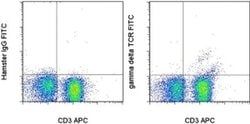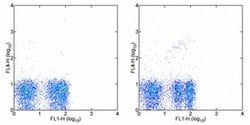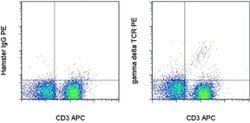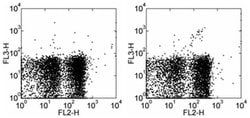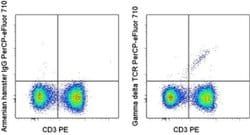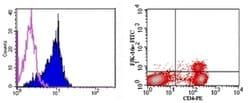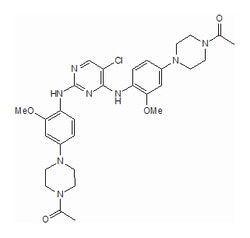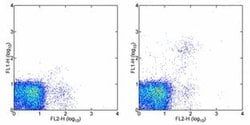50-984-3
TCR gamma/delta Monoclonal Antibody (eBioGL3 (GL-3, GL3)), FITC, eBioscience™, Invitrogen™
Manufacturer: Fischer Scientific
Select a Size
| Pack Size | SKU | Availability | Price |
|---|---|---|---|
| Each of 1 | 50-984-3-Each-of-1 | In Stock | ₹ 30,349.00 |
50-984-3 - Each of 1
In Stock
Quantity
1
Base Price: ₹ 30,349.00
GST (18%): ₹ 5,462.82
Total Price: ₹ 35,811.82
Antigen
TCR gamma/delta
Classification
Monoclonal
Concentration
0.5 mg/mL
Formulation
PBS with 0.09% sodium azide; pH 7.2
Gene Accession No.
0
Gene Symbols
Tcrd, Tcrg
Purification Method
Affinity chromatography
Regulatory Status
RUO
Gene ID (Entrez)
110066, 110067
Content And Storage
4° C, store in dark, DO NOT FREEZE!
Form
Liquid
Applications
Flow Cytometry
Clone
eBioGL3 (GL-3, GL3), GL3)
Conjugate
FITC
Gene
Tcrd
Gene Alias
RGD1311300; similar to T cell receptor V delta 6; T cell receptor gamma locus; T3/TCR complex; TCR delta gamma; TCR gamma/delta; TCR-CD3 complex; Tcrg; Trg; Trg@
Host Species
Armenian Hamster
Quantity
500 μg
Primary or Secondary
Primary
Target Species
Mouse
Product Type
Antibody
Isotype
IgG
Related Products
Description
- Description: The GL3 monoclonal antibody (mAb) reacts with the gamma delta T-cell Receptor complex (TCR) on all gamma delta TCR bearing T cells, but it does not react with alpha beta TCR
- The gamma delta TCR is present on cells in the thymus, epidermis, epithelial lining of the intestine, peritoneal cavity, and lymphoid tissues
- Applications Reported: This GL3 (GL-3) antibody has been reported for use in flow cytometric analysis
- It is recommended to prestain cells with anti-mouse CD16/32 (cat
- 14-0161) to prevent non-specific Fc-mediated binding of the GL3 monoclonal antibody
- Applications Tested: This eBioGL3 (GL-3, GL3) antibody has been tested by flow cytometric analysis of mouse lymph node cells
- This can be used at less than or equal to 0.5 μg per test
- A test is defined as the amount (μg) of antibody that will stain a cell sample in a final volume of 100 μL
- Cell number should be determined empirically but can range from 10^5 to 10^8 cells/test
- It is recommended that the antibody be carefully titrated for optimal performance in the assay of interest
- Excitation: 488 nm; Emission: 520 nm; Laser: Blue Laser
- Filtration: 0.2 μm post-manufacturing filtered
- TCR gamma/delta (T-cell receptor gamma/delta) are specialized T-cells in the immune system
- The ability of T cell receptors (TCR) to discriminate foreign from self-peptides presented by major histocompatibility complex (MHC) class II molecules is essential for an effective adaptive immune response
- TCR recognition of self-peptides has been linked to autoimmune disease
- Mutant self-peptides have been associated with tumors
- Engagement of TCRs by a family of bacterial toxins know as superantigens has been responsible for toxic shock syndrome
- Autoantibodies to V beta segments of T cell receptors have been isolated from patients with rheumatoid arthritis (RA) and systemic lupus erythematosus (SLE)
- The autoantibodies block TH1-mediated inflammatory auto-destructive reactions and are believed to be a method by which the immune system compensates for disease
- Most human T cells express the TCR alpha-beta and either CD4 or CD8 molecule (single positive, SP)
- However, a small number of T cells lack both CD4 and CD8 (double negative, DN)
- Increased percentages of alpha-beta DN T cells have been identified in some autoimmune and immunodeficiency disorders
- Gamma-delta T cells are primarily found within the epithelium
- They show less TCR diversity and recognize antigens differently than alpha-beta T cells
- Subsets of gamma-delta T cells have shown antitumor and immunoregulatory activity.
Compare Similar Items
Show Difference
Antigen: TCR gamma/delta
Classification: Monoclonal
Concentration: 0.5 mg/mL
Formulation: PBS with 0.09% sodium azide; pH 7.2
Gene Accession No.: 0
Gene Symbols: Tcrd, Tcrg
Purification Method: Affinity chromatography
Regulatory Status: RUO
Gene ID (Entrez): 110066, 110067
Content And Storage: 4° C, store in dark, DO NOT FREEZE!
Form: Liquid
Applications: Flow Cytometry
Clone: eBioGL3 (GL-3, GL3), GL3)
Conjugate: FITC
Gene: Tcrd
Gene Alias: RGD1311300; similar to T cell receptor V delta 6; T cell receptor gamma locus; T3/TCR complex; TCR delta gamma; TCR gamma/delta; TCR-CD3 complex; Tcrg; Trg; Trg@
Host Species: Armenian Hamster
Quantity: 500 μg
Primary or Secondary: Primary
Target Species: Mouse
Product Type: Antibody
Isotype: IgG
Antigen:
TCR gamma/delta
Classification:
Monoclonal
Concentration:
0.5 mg/mL
Formulation:
PBS with 0.09% sodium azide; pH 7.2
Gene Accession No.:
0
Gene Symbols:
Tcrd, Tcrg
Purification Method:
Affinity chromatography
Regulatory Status:
RUO
Gene ID (Entrez):
110066, 110067
Content And Storage:
4° C, store in dark, DO NOT FREEZE!
Form:
Liquid
Applications:
Flow Cytometry
Clone:
eBioGL3 (GL-3, GL3), GL3)
Conjugate:
FITC
Gene:
Tcrd
Gene Alias:
RGD1311300; similar to T cell receptor V delta 6; T cell receptor gamma locus; T3/TCR complex; TCR delta gamma; TCR gamma/delta; TCR-CD3 complex; Tcrg; Trg; Trg@
Host Species:
Armenian Hamster
Quantity:
500 μg
Primary or Secondary:
Primary
Target Species:
Mouse
Product Type:
Antibody
Isotype:
IgG
Antigen: FOXP3
Classification: Monoclonal
Concentration: 0.5 mg/mL
Formulation: PBS with 0.09% sodium azide; pH 7.2
Gene Accession No.: Q99JB6
Gene Symbols: Foxp3
Purification Method: Affinity chromatography
Regulatory Status: RUO
Gene ID (Entrez): 100037405, 20371, 317382, 444998, 491876, 506053
Content And Storage: 4° C, store in dark, DO NOT FREEZE!
Form: Liquid
Applications: Flow Cytometry, Immunohistochemistry (Frozen)
Clone: FJK-16s
Conjugate: FITC
Gene: Foxp3
Gene Alias: AIID; DIETER; forkhead box P3; forkhead box protein P3; Forkhead box protein P3 41 kDa form; Forkhead box protein P3, C-terminally processed; forkhead/winged helix transcription factor 3; Foxp3; FOXP3delta7; immune dysregulation, polyendocrinopathy, enteropathy, X-linked; immunodeficiency, polyendocrinopathy, enteropathy, X-linked; IPEX; JM2; MGC141961; MGC141963; PIDX; regulatory protein Foxp3; RGD1562112; RP23-54C14.1; scurfin; scurfy; sf; XPID
Host Species: Rat
Quantity: 25 μg
Primary or Secondary: Primary
Target Species: Bovine, Canine, Feline, Mouse, Porcine, Rat
Product Type: Antibody
Isotype: IgG2a κ
Antigen:
FOXP3
Classification:
Monoclonal
Concentration:
0.5 mg/mL
Formulation:
PBS with 0.09% sodium azide; pH 7.2
Gene Accession No.:
Q99JB6
Gene Symbols:
Foxp3
Purification Method:
Affinity chromatography
Regulatory Status:
RUO
Gene ID (Entrez):
100037405, 20371, 317382, 444998, 491876, 506053
Content And Storage:
4° C, store in dark, DO NOT FREEZE!
Form:
Liquid
Applications:
Flow Cytometry, Immunohistochemistry (Frozen)
Clone:
FJK-16s
Conjugate:
FITC
Gene:
Foxp3
Gene Alias:
AIID; DIETER; forkhead box P3; forkhead box protein P3; Forkhead box protein P3 41 kDa form; Forkhead box protein P3, C-terminally processed; forkhead/winged helix transcription factor 3; Foxp3; FOXP3delta7; immune dysregulation, polyendocrinopathy, enteropathy, X-linked; immunodeficiency, polyendocrinopathy, enteropathy, X-linked; IPEX; JM2; MGC141961; MGC141963; PIDX; regulatory protein Foxp3; RGD1562112; RP23-54C14.1; scurfin; scurfy; sf; XPID
Host Species:
Rat
Quantity:
25 μg
Primary or Secondary:
Primary
Target Species:
Bovine, Canine, Feline, Mouse, Porcine, Rat
Product Type:
Antibody
Isotype:
IgG2a κ
Antigen: __
Classification: __
Concentration: __
Formulation: __
Gene Accession No.: __
Gene Symbols: __
Purification Method: __
Regulatory Status: __
Gene ID (Entrez): __
Content And Storage: __
Form: __
Applications: __
Clone: __
Conjugate: __
Gene: __
Gene Alias: __
Host Species: __
Quantity: 50 mg
Primary or Secondary: __
Target Species: __
Product Type: KRCA 0008
Isotype: __
Antigen:
__
Classification:
__
Concentration:
__
Formulation:
__
Gene Accession No.:
__
Gene Symbols:
__
Purification Method:
__
Regulatory Status:
__
Gene ID (Entrez):
__
Content And Storage:
__
Form:
__
Applications:
__
Clone:
__
Conjugate:
__
Gene:
__
Gene Alias:
__
Host Species:
__
Quantity:
50 mg
Primary or Secondary:
__
Target Species:
__
Product Type:
KRCA 0008
Isotype:
__
Antigen: Ly-49G2
Classification: Monoclonal
Concentration: 0.5 mg/mL
Formulation: PBS with 0.09% sodium azide; pH 7.2
Gene Accession No.: Q60654
Gene Symbols: Klra7
Purification Method: Affinity chromatography
Regulatory Status: RUO
Gene ID (Entrez): 16638
Content And Storage: 4° C, store in dark, DO NOT FREEZE!
Form: Liquid
Applications: Flow Cytometry
Clone: eBio4D11 (4D11)
Conjugate: FITC
Gene: Klra7
Gene Alias: Killer cell lectin-like receptor 7; killer cell lectin-like receptor, subfamily A, member 7; Klra7; LGL-1; Ly49g; ly-49g; Ly49-g; Ly-49G.1; Ly-49G.2; Ly-49G.3; Ly49G.4; Ly49g1; Ly49g2; Ly49g4; Lymphocyte antigen 49g; T-cell surface glycoprotein Ly-49G
Host Species: Rat
Quantity: 100 μg
Primary or Secondary: Primary
Target Species: Mouse
Product Type: Antibody
Isotype: IgG2a κ
Antigen:
Ly-49G2
Classification:
Monoclonal
Concentration:
0.5 mg/mL
Formulation:
PBS with 0.09% sodium azide; pH 7.2
Gene Accession No.:
Q60654
Gene Symbols:
Klra7
Purification Method:
Affinity chromatography
Regulatory Status:
RUO
Gene ID (Entrez):
16638
Content And Storage:
4° C, store in dark, DO NOT FREEZE!
Form:
Liquid
Applications:
Flow Cytometry
Clone:
eBio4D11 (4D11)
Conjugate:
FITC
Gene:
Klra7
Gene Alias:
Killer cell lectin-like receptor 7; killer cell lectin-like receptor, subfamily A, member 7; Klra7; LGL-1; Ly49g; ly-49g; Ly49-g; Ly-49G.1; Ly-49G.2; Ly-49G.3; Ly49G.4; Ly49g1; Ly49g2; Ly49g4; Lymphocyte antigen 49g; T-cell surface glycoprotein Ly-49G
Host Species:
Rat
Quantity:
100 μg
Primary or Secondary:
Primary
Target Species:
Mouse
Product Type:
Antibody
Isotype:
IgG2a κ
